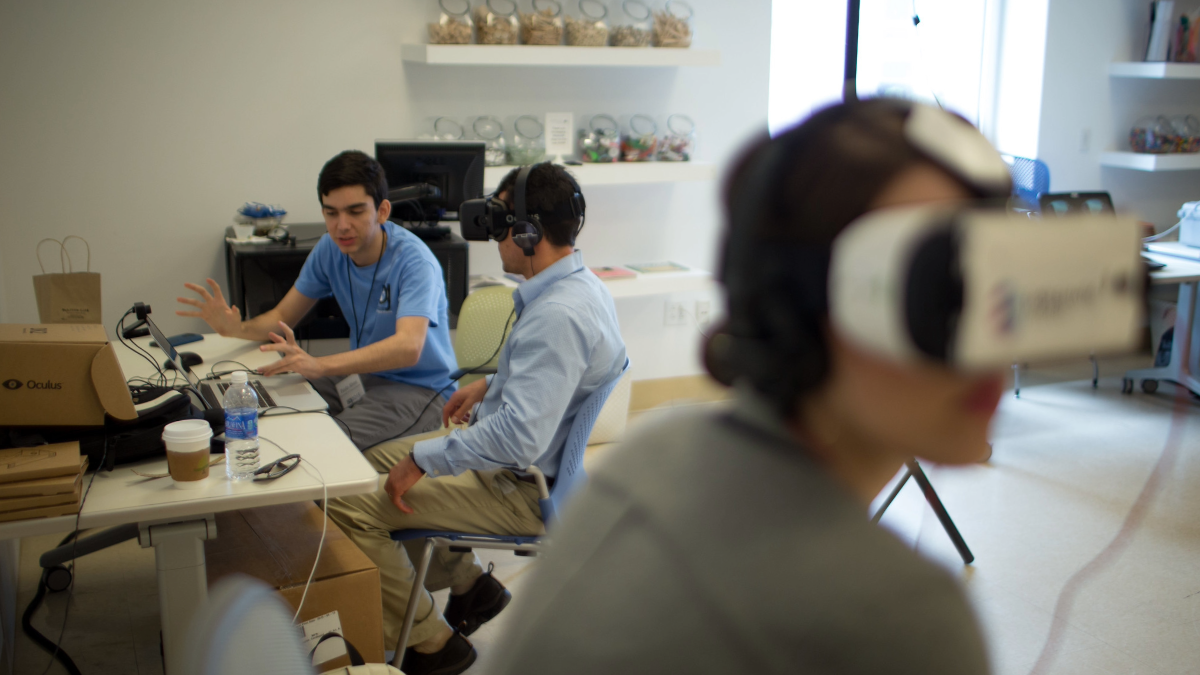How XR Tech Workers Can Mobilize to Prevent Unethical Uses of the Emerging Technology
Chen Yan, Elizabeth K. Mzungu / May 8, 2024
"Virtual Reality Demonstrations" by UTKnightCenter is licensed under CC BY 2.0.
The community of technologists developing extended reality (XR) technologies – including virtual, augmented, and mixed reality devices and software – requires conscience from within. Imagine a government using XR systems in functions like immigration law enforcement. What will the government do with the additional information that XR can collect in the form of additional movement-based data, body-based data, biometrics, as well as location-based data? Who can hold companies accountable before the products are released to the public?
The development of XR technology presents new potential dangers arising from the amount of body-based data that can be collected about individuals and their surroundings as well as the creation of experiences that are far more immersive than ever before. Some tech workers have already demonstrated their concerns about potential dystopian uses of the technology they helped develop. These concerns may arise particularly for those who work in developing and presenting the products in roles such as software engineers, product managers, UI/UX designers, and data scientists. In these roles, tech workers are uniquely positioned as the technical experts in the room, with front row seats to view the endless possibilities and potential harms of the technology. Technologies in and of themselves have no innate mechanism to decipher what is right and wrong. Therefore, tech workers ought to consider what role they have in not only offering the knowledge they have but also in developing spaces with a conscience from within. This will require them to not only meet the demands of their employers and push the limits of their abilities to innovate, but to also develop products that do not cause harm to users in the products and experiences they develop.
It is important to acknowledge that development of new product offerings is primarily shaped by the parameters given by executive leadership, who establish corporate priorities, and product managers, who make strategic and tactical decisions. The ability of tech workers to shape the conscience within XR is further complicated by the reality that the few influential players in the market are behemoth companies like Google, Meta, Microsoft, and Apple. The concentration of big tech affects tech workers’ job mobility and decision-making, which is mainly driven by competition and market factors.
There are examples of tech workers taking ethical stands against corporate priorities. Amazonians successfully rallied to halt Amazon’s sale of its facial recognition product to law enforcement. The "NoTechForIce'' movement protested to terminate Palantir’s data-mining contract with immigration authorities. Similarly, Googlers resisted Google’s Project Maven, an AI program analyzing drone surveillance footage in the battlefield. In these instances, tech workers influenced the decision making on the uses of their products and formed an alternative source of governance from the bottom-up. Moving into the XR era, as the technology becomes increasingly fast-paced and invasive, tech workers will shoulder greater responsibility to foresee and guard against the dystopian uses of their work products.
Despite tech workers having to work within the constraints of their company’s priorities, tech workers are still keepers of the technical expertise required to maximize XR products and experiences. Over and above their technical skills, tech workers are also directly involved in the problem-solving process of product development and can therefore raise problems that may not be considered by other cross-functional team members who do not have the same level of understanding of the potential impact on users. Furthermore, tech workers at the earlier stages of emerging technology development are the primary architects of features and functions implemented by companies. The process of XR development and participation in the feedback loop to managers and designers with their expertise provides significant opportunity for tech workers to put in controls and make ethical product design decisions before harms are caused to users.
While advocating for XR tech workers’ more active participation in social movements for more fair and equitable application of new technologies, it is important to also recognize the practical hardships for workers to mobilize and resist employers’ problematic involvement in certain law enforcement and military applications. As recently as April 17, a number of employees were fired and arrested for protesting Google’s provision of cloud computing and AI services to the Israeli government and military, which they regard as acting unjustly in Gaza. The current tech sector fails to cultivate a supportive environment for employee unionization and mobilization, so employees are often hesitant to advocate against their employers considering their job and financial security is at stake. Presently, the tech sector is the largest employer of H-1B visa holders. These visa-holding employees would be even more vulnerable and are likely to be less willing to stand up against their employers despite their potential alignment with underrepresented groups. Moreover, the tech sector is still struggling to achieve the diversity and inclusion it's leaders claim to value. The lack of diversity will make the tech sector, including the XR sector, vulnerable to making ethically challenged and tone-deaf decisions resulting in the further exclusion of many minority communities.
Yet, recognizing these challenges doesn’t mean that tech workers should insulate themselves from solidarity with concurrent social movements – they can, instead, seek alternative ways to seek just and ethical applications of technology, in ways that produce less collision with their employers and more straightforward benefits to communities in need of help.
The challenges faced by tech workers in holding companies accountable from within require tech workers to think creatively about how they can influence the way in which XR takes shape from the foundation up. As workers protected by US labor laws, the potential threat to their job security highlights the need for tech workers to collaborate with community and movement lawyers to strengthen their knowledge of the legal rights and protections afforded to them.
While unionizing may not be an immediate solution for the tech industry, where many lay-offs are taking place as a result of market pressures, leadership decisions, and technological advancements, tech workers are still entitled to protection against discrimination as well as remedies provided through public services such as the Equal Employment Opportunity Commission (EEOC) that are mandated to address systemic discrimination of workers. A further way in which the obstacles of unionizing can be overcome is through the formation of organizations such as the Tech Workers Coalition, where tech workers and organizers are working in solidarity.
For tech workers who decide to take action but struggle to find support at their workplaces, they can consider whistleblowing processes. It is worth noting that whistleblowing, though a longstanding way of individual activism, has always been subject to dangers that are out of the individual’s control, as outside support often fails to align perfectly with the needs of the advocating individual. However, whistleblowers do have protection under federal laws on whistleblowing that protect their own identities as well as minimize risks of retaliation by reporting to Congress on potential violations of federal laws. In addition to this, there are tech-specific guidelines and platforms such as the Tech Worker Handbook that connect individual whistleblowers and provide relevant resources and a community of support in response to the vulnerabilities faced by individual whistleblowers. Whistleblowers are not isolated from assistance from others – they may work strategically with the whistleblower community, colleagues, civil societies, press, and the government. They may also choose to engage with lawyers with relevant specialties on the potential consequences of their actions.
Tech workers are increasingly working to make the XR industry more diverse and contributing to organizing efforts by creating platforms for workers to organize in a safe way/without interference. Initiatives such as Coworkers.org have made use of existing technologies to help workers mobilize. XR Inclusion, similarly, takes initiative to proactively spot and resolve the diversity challenges within the XR industry – it recognizes the need to lead the tech sector into a more inclusive and diverse future.
In many ways, XR also presents opportunities for the creation of safe environments where tech workers can engage one another and organizers in more immersive ways. The potential interoperability of XR platforms also creates the opportunity for tech workers to build further connections between different stakeholders and systems in the community organizing space. The use of XR can help maximize the sharing of resources, facilitate more effective communication, and drive synergy between community organizers even outside the tech industry.
In addition to receiving help from legal experts and federal legal protections, tech workers can also engage in their personal capacity by using their expertise to strengthen the efforts of community organizers in ways that do not breach their conscience or employment obligations. Beyond specific organizations or campaigns, tech workers with knowledge of emerging XR technologies can further bolster public interest technologies, e-citizen engagement as well as contribute to existing efforts to bridge the digital divide that is likely to be widened by XR technologies due to cost and initial accessibility barriers that come with new technologies.
As XR technology continues to evolve, it's crucial to recognize the pivotal role that XR tech workers play in shaping its ethical implementation. These workers, with their expertise and insider knowledge, are at the forefront of advocating for fair and responsible use of emerging technology within their corporations. The powerful nature of XR technology means that the advocacy can take in a greater variety of forms. With the possibilities available to tech workers to overcome existing challenges in organizing, we can still hope for the preservation of knowledge and conscience from within XR development.
Authors

